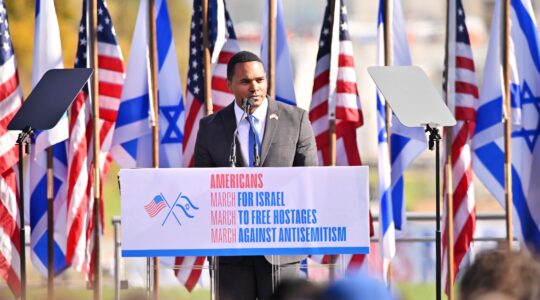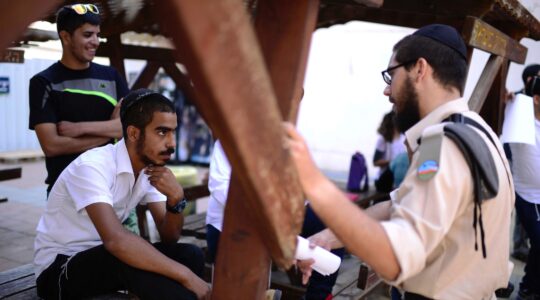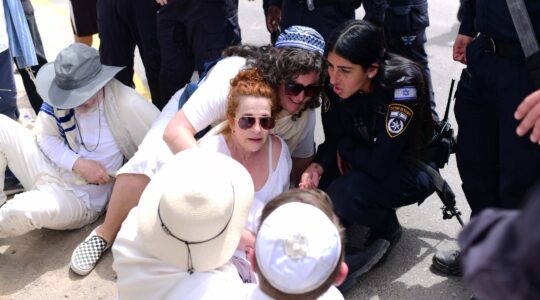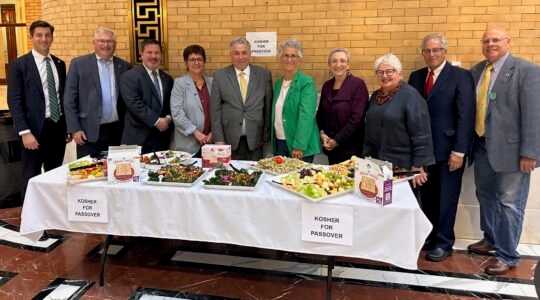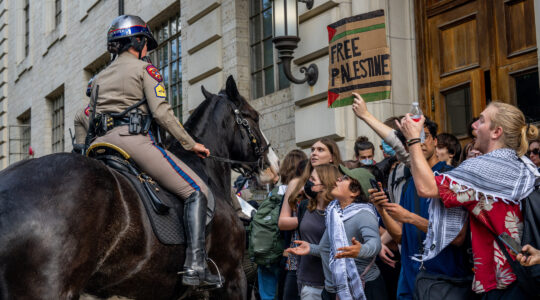WASHINGTON (JTA) – President Bush used his annual Chanukah meeting with Jewish leaders to invite figures who had experienced persecution throughout the world.
Among the 15 individuals who joined the president at the White House on Monday, International Human Rights Day, were Elliott Benjamin, the vice president of the Iranian American Jewish Federation; Rabbi Gershom Sizomu of the Abayudaya Jews of Uganda; Holocaust survivors Gerald and Joan Schwab; and Judea and Ruth Pearl, parents of the Wall Street Journal reporter Daniel Pearl, who was murdered by al-Qaida operatives shortly after the Sept. 11, 2001 terrorist attacks.
Yuli Edelstein, a former Soviet refusenik and the deputy speaker of the Israeli Knesset, also was on hand for the 90-minute discussion.
“It was a very interesting crowd of people,” Edelstein said. “Most had experienced persecution in their country, and except for myself everyone resides in the United States.”
Edelstein was here as well to participate in events marking the 20th anniversary of the march on Washington, which brought some 250,000 activists to lobby for the right of Soviet Jews to emigrate.
That march was sponsored by NCSJ: Advocates on behalf of Jews in Russia, Ukraine, the Baltic States and Eurasia, which held a symposium on the past and future of the Soviet Jewry movement and a congressional reception Tuesday recognizing the anniversary of the march.
U.S. Sens. Joe Lieberman (I-Conn.) and Frank Lautenberg (D-N.J.) and Rep. Henry Waxman (D-Calif.) hosted the reception and photo exhibition in the rotunda of the U.S. Capitol
At the reception, Edelstein said Bush told him, ‘I’m not imposing a terrorist state on you.’
“My message is that peace is not around the corner, no matter what some people might say to the president,” Edelstein said. “It may take decades and decades to change the situation in the Middle East.”
He said later, “The idea of a Palestinian state is for creating a coalition of moderate groups in the Middle East. “[The president] believes the creation of a Palestinian state puts an end to the right of return for Palestinians” to Israel.
Edelstein said that one of the refugees that met Monday with Bush, Maurice Shohut, spoke plainly to the president about the many Jewish refugees throughout the Middle East. Shohut, a research analyst at the Middle East Institute in Washington, left Iraq many years ago.
“The world brings up the issue of refugees, but what about us?” Edelstein asked. “There are over a million Jewish refugees. What about the equation here?”
Several of the attendees at the meeting are members of Be’chol Lashon, a group of multiracial and multiethnic rabbis and Jewish leaders that is an arm of the Institute for Jewish and Community Research.
Gary Tobin, the group’s president, was instrumental in coordinating a meeting that he said makes an “important statement at the highest level that Jews are a global people.”
Tobin added that the meeting was in part a response to the frequently heard notion in America, in part promulgated by the writings of former President Jimmy Carter, that Israel is an apartheid state, not the truly diverse culture that Israelis know.
Rabbi Gershom Sizomu is a Ugandan who survived the years of forced conversions during Idi Amin’s brutal 1970s dictatorship. During that time, the Ugandan Jewish population fell from 3,000 to 800, primarily due to the conversions. Rabbi Sizomu has been studying in Los Angeles for five years.
“He actually wanted to hear our stories,” said Rabbi Sizomu of the president. “We all came from countries that had lived under a dictatorship at one time. Each of us suggested ways the United States government could help improve on democracy and leadership in our country.”
Rabbi Sizomu asked the president to help Uganda’s leaders to hold peaceful elections, a rarity in a nation where power is often achieved through military force.
Rabbi Sizomu’s father and grandfather were both highly respected rabbis in the eastern Ugandan Abayudaya community, which enabled them to weather the Amin regime without being forced to convert.
He laughs at how easy he finds it to be Jewish in America, though he still finds people are always surprised that he is an African Jew.
“You have kosher butchers. We don’t have kosher restaurants,” he said. “That’s made us more conscious of our Judaism because of the difficulty of living as Jews.”
Bush also spoke with the group about the dangers still posed by Iran, even in light of the recent release of the National Intelligence Estimate stating that Iran ceased its nuclear weapons program in 2003.
“The most important message I heard was that he said whoever becomes president after me, once he or she learns the facts about Iran, wouldn’t be able to see the situation there differently,” Edelstein said.
Edelstein, who was permitted to leave Russia 20 years ago due in part to the efforts of the Reagan administration, in which Bush’s father served as vice president, said he spoke candidly with the president about the current human rights situation in Russia.
“As I mentioned to the president, the situation develops in Russia in a very peculiar way. It’s like the Chinese model,” he said. “They have more or less open borders and a Western-oriented economy, but at the same time no human rights, basically no free press today.”
The situation in Russia has improved dramatically since Soviet times, but Edelstein cautioned that the recent rise in anti-Semitic attacks and the popularity of hate groups in Russia cannot be overlooked.
“The Jews can leave, but on the other hand we know how dynamic the situation must be,” he said. “We all need to understand that Russia likes very much to be popular in the West. They still don’t want to be attacked on human rights. It’s important that the Russians understand that people are watching.”
